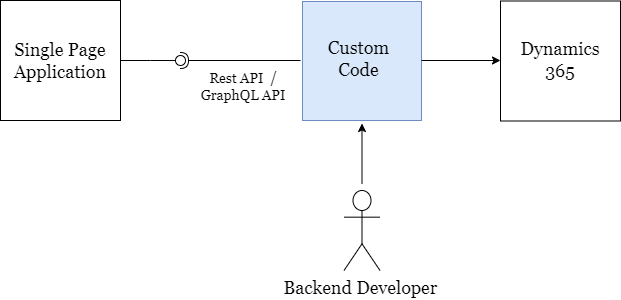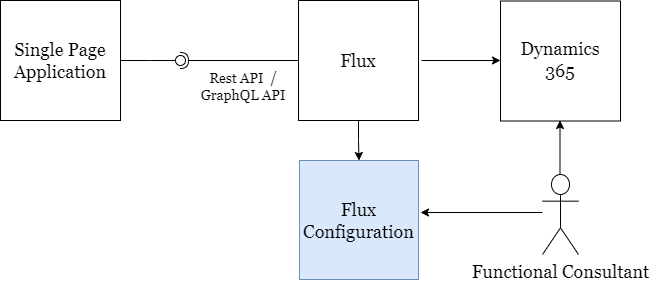What is Flux Api Studio
Introduction
Flux is an accelerator for developing custom applications on top of Dynamics 365. It streamlines the process of creating APIs, obviating the need for extensive coding when interfacing with Dynamics 365. Flux is a dynamic API generator that consumes a set of configuration files and can generate either GraphQL or RESTful APIs based on the requested need. This versatility makes it apt for constructing rich UI applications that cater to varied integration requirements. To understand better how Flux is elevating the development process, let's capture the current state of application development on top of Dynamics 365.
Where We Stand: Development Today
In traditional architectures involving web or mobile applications integrated with Dynamics 365, the creation of REST or GraphQL APIs is predominantly undertaken by specialized individuals, commonly known as "backend developers." Before commencing the development of these APIs, it's imperative for the developer to grasp the nuances of Dynamics 365 customization, an area often overseen by a functional consultant.
Gaining this intricate insight can be particularly challenging due to various factors: scheduling conflicts, the intricacy of the customizations, and the potential pitfalls of informal knowledge transfer, especially in the absence of comprehensive documentation.
Moreover, backend developers must constantly adapt to the evolving modifications in Dynamics 365, ensuring that their code aligns seamlessly with the platform's customizations. These factors can culminate in prolonged implementation durations, project setbacks, and an increased propensity for application anomalies.

It's worth noting that functional consultants, given their profound familiarity with Dynamics 365 implementations, might be better positioned to develop these APIs. However, this would necessitate that they delve into coding, which may not align with their primary skill set. Flux aims to address this distribution of roles, transitioning the responsibility from backend developers to functional consultants. Subsequent sections will elucidate the enhanced development landscape facilitated by Flux.
Development: A Forward Look
In the modern development landscape, efficient API generation, whether GraphQL or REST, is crucial. Flux has been designed to streamline this process for Dynamics 365, tailored to generate either API type depending on the specific request.
With the assistance of Flux, a functional consultant is tasked with the creation and maintenance of a comprehensive set of configuration files. These files serve as the primary input to the Flux engine. It is imperative for the functional consultant to possess an in-depth understanding of the user interface's requirements. This knowledge ensures that the configuration files are optimized to address specific needs, leading to a seamless integration between the back-end Dynamics 365 system and the front-end user interface.
Upon processing these configuration files, the Flux engine dynamically generates either a GraphQL or REST API based on the outlined specifications. This generated API becomes an invaluable resource for UI developers. If it's a GraphQL API, developers can leverage the capabilities of GraphQL introspection to retrieve the schema. For REST, appropriate tools and methodologies can be employed. This schema or interface provides the foundational blueprint upon which web and mobile applications can be built, ensuring tight integration with the underlying Dynamics 365 platform.

A distinguishing feature of the Flux system is its ability to drastically reduce development timelines. Preliminary assessments indicate that, through the use of Flux, there's a potential reduction in development time by as much as 80%. This is largely attributable to the minimization or outright elimination of custom or boilerplate code typically associated with API creation.
Moreover, the modular nature of Flux's configuration files ensures a high degree of flexibility. Any modifications made to these files are directly mirrored in the behavior and structure of the generated GraphQL or REST API. This dynamic system means that as new customizations or features are introduced to Dynamics 365, the functional consultant can swiftly update the configuration files to reflect these changes. Their primary responsibility, in this evolving ecosystem, remains the continuous update and optimization of these files to ensure synchronization with Dynamics 365's ever-evolving capabilities.
What's Next?
Having explored the intricacies of Flux API Studio and its transformative impact on API development, our journey doesn't end here. The true magic lies in the mechanisms operating in the background. Let's delve deeper and unveil the inner workings of the API generator, shedding light on the processes that power its unparalleled efficiency.